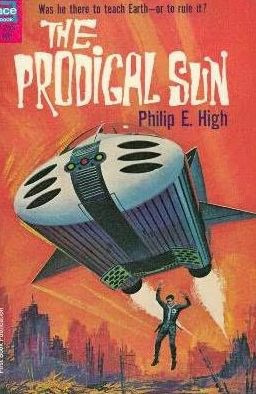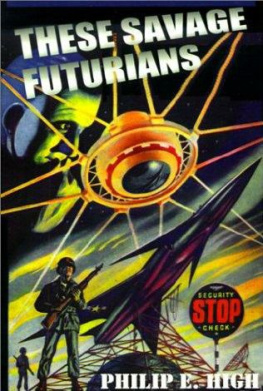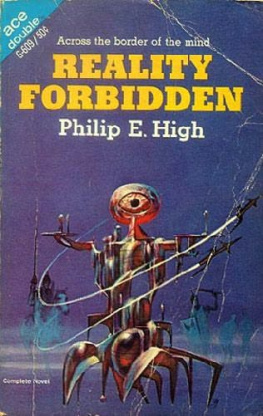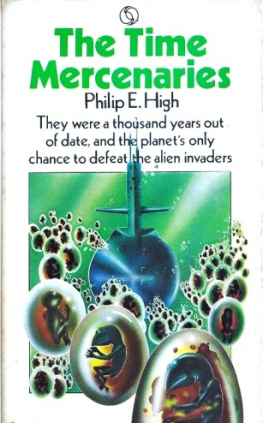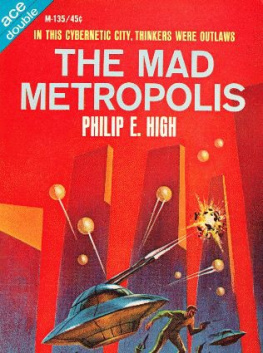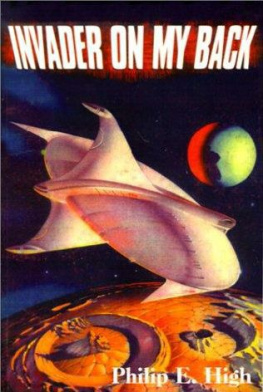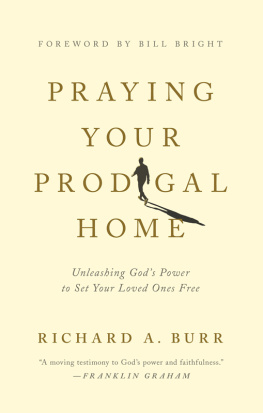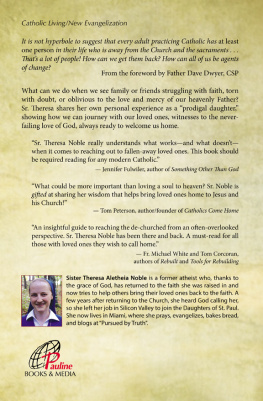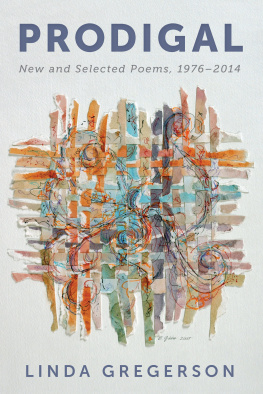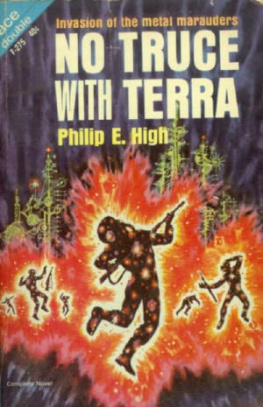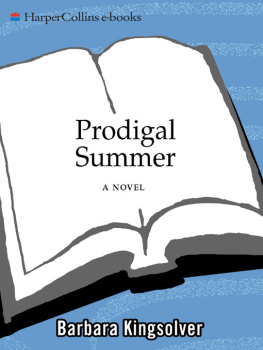The Prodical Sun
By Philip E. High
CHAPTER ONE
THEY HAD NOT named the age, in truth there were few words to describe it. The world had known times of plenty and times of famine, ages of freedom and years of dictatorship. There had even been brief, if localized, periods of near perfection but this was not one of them.
This period took the worst, threw them together and made quite sure that nothing good got in.
It was not really the world's fault, having been pitchforked into it. Mankind had just concluded its first interstellar war but the word victory was purely relative.
True the enemy was flat on its back and quite helpless but Earth had come out of the encounter on all fours. Today, five years after the enemy's unconditional surrender, Earth was still licking its wounds and unable to climb to its knees.
The race was sick, sick of its leaders and sick of each other. Its gut ached from over-doses of expediency and its sinews creaked with the bitterest cynicisms.
Whether the men in the long conference room were products or victims of the age is an academic question and wholly irrelevant - it didn't make them any nicer. They were mean, hard men, uninfluenced by any consideration save advancement in their wholly personal rat-race.
This was the age of dog-eat-dog, here the cheap chiseler, the terrorist and the extortioner blossomed like flowers on a refuse heap.
First there was General Statten, a harsh little man with beady eyes and the face of an irritable peanut. The General wore a smart uniform, impressive rows of ribbons and decorations but he had flown a desk in an impregnable H.Q. two thousand feet under the Andes. He was a political general, a brilliant organizer with a singular ability for discrediting those immediately above him. Station's climb to the top had been a tour-de-double-cross.
Facing him was Dowd, the industrialist, who had, during the years of sorrow, acquired a financial empire without parallel in human history. Dowd was insatiable, having grown drunk on power, he had developed an everlasting thirst for more. He would have liked to possess the world but Kaft wouldn't let him.
Kaft represented the secret police. Kaft kept secret files but neither could bring the other down without his own collapse. Dowd had insinuated himself so deeply into the financial sinews of the race that he could not be removed without the collapse of the economy.
Kaft, on the other hand, held those revealing files and his untimely death would bring them to light. Both took great care that the other stayed alive but they hated each other venomously.
It was difficult to understand, even in war, how a police state had arisen from a loosely democratic government. People don't turn round and say: "Let's have a secret police," or do they?
In an all-out war manufacturing plants are switched from luxury goods to war production and, inevitably, there are shortages and out of shortages grows the black market.
In war the best food goes to the fighting men and there is rationing for the civilian population. A thousand and one petty criminals rush forward to bleed off this flow of supplies and the black market grows. Beside it spring up subsidiary rackets, grafting on government contracts, phony committees preying on the patriotic, forged papers for the draft-dodger.
The government has to counter these activities under emergency powers and specially trained forces have to be created to deal with civil corruption. Maybe, after all, people do turn round and say: "Let's have a secret police."
Kaft was it. He had borrowed the techniques of all the police systems which had preceded him and added a few of his own.
After a twenty-five year war it had got so bad that people were afraid to be silent in case their lack of words be interpreted as sullen resentment against existing order. They were also afraid to speak.
Kaft with his pinched pink senile face and scraggy neck. A man with a mouth like a coin slot in a public vending machine, listening and biding his time.
"I don't like it." Rickman rolled the cigar from one side of his mouth to the other. "It's all very well for Dowd to rub his hands and dream of extending his empire but this could be dangerous. In my opinion we could do without our visitor. In my opinion this man is a louse but he could also be a menace."
He took the cigar from his mouth and pointed it at them. "I'll concede that his knowledge is valuable, immensely valuable, but getting at it is another thing. A jewel encrusted bomb is just as dangerous as the other kind and digging out a few of the gems is a poor return if the damn thing blows your head off before you've finished."
"Bombs have been de-fused before now," said Dowd, stubbornly.
"Bombs we understand."
"Even bombs we don't. The Vrenka had a lot of gimmicks in the war but we licked most of them."
"It's a danger to the whole race." There were rare occasions when Rickman teetered on the brink of political honesty. "This louse sat out the whole war on a neutral planet and we're going to welcome him back as a V.I.P. Hell, he may not even be Duncan, he might be a damned alien or, at the very least, a 'plant' for the Mattrain. All this red carpet stuff is being laid on because Dowd wants to bleed him of advanced technologies and, I repeat, it's damned dangerous, best keep him away."
He thrust the cigar back in his mouth and chewed at it angrily. "We could sell out the race for thirty technical blue prints and Dowd could be chief Judas."
Dowd sighed and smiled twistedly. He did not look at the politician but addressed the others. "When our public spirited friend draws on his meager biblical knowledge I must confess I am impressed, however - " Dowd paused and smiled meaningly. "Mr. Rickman should take time off for self-analysis because, believe me, he is highly skilled in the art of implication." He looked at the other directly. "Mr. Rickman would like others not only to arrange the crucifixion but to wash his hands as well. What our political friend is trying to 'say, without, of course, implicating himself is: 'Let's knock our visitor off as soon as he arrives."
"I protest!" Rickman was on his feet, flushed and angry.
"Order! Order!" Hodges the chairman banged his gavel noisely. "The purpose of this meeting is procedure"
"Gentlemen, please." Kaft rose, his timing, as always, was perfect. "Mr. Rickman's apprehensions are not only understandable but commendable." He paused. His genius for soothing insincerities was well known but seldom failed to convince at the time. "It is quite true that Duncan may be a 'plant' for the Mattrain or, at the very least, working for their espionage organization but we are not quite fools."
Duncan will be under constant surveillance and" - he smiled slyly - "I have detailed a special bodyguard to 'protect' him. After the first few public receptions Duncan won't get near enough to anyone or anything to be dangerous.
"One question," General Statten's little eyes were hard but alert. "I have received information that Independent News has appointed a permanent contact. Thanks to its blasted charter rights we couldn't block the move."
Kaft smiled thinly. "We didn't try, too obvious. Let him report until public interest wanes."
Rickman said, "Who is this contact and what's his job?"
Kaft leaned down and extracted something from a briefcase. "I have his file here. His job is to write up a day by day account of Duncan and his reactions to Earth. If we handle this carefully we may learn quite a lot."
"And the contact himself?"
"A man named Mark Gaynor, he's been screened of course. Has a flair for factual reporting but fortunately an extrovert and without subtlety. An excellent war record incidentally, organized and personally lead four successful commando raids on Vrenka bases in the latter stages of the war. Decorated twice, achieved rank of major - " Kaft closed the file slowly. "A hard, tough man but excellent for our purpose. If we have to rub out Duncan in a hurry we have a scapegoat conveniently at hand."

